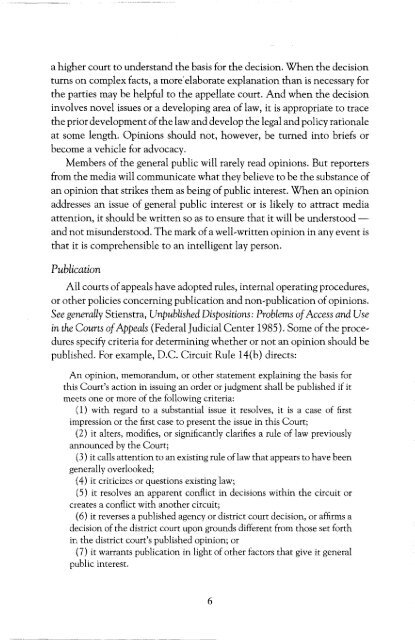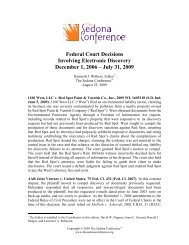Judicial Writing Manual - Federal Judicial Center
Judicial Writing Manual - Federal Judicial Center
Judicial Writing Manual - Federal Judicial Center
You also want an ePaper? Increase the reach of your titles
YUMPU automatically turns print PDFs into web optimized ePapers that Google loves.
a higher court to understand the basis for the decision. When the decision<br />
turns on complex facts, a more'elaborate explanation than is necessary for<br />
the parties may be helpful to the appellate court. And when the decision<br />
involves novel issues or a developing area of law, it is appropriate to trace<br />
the prior development of the law and develop the legal and policy rationale<br />
at some length. Opinions should not, however, be turned into briefs or<br />
become a vehicle for advocacy.<br />
Members of the general public will rarely read opinions. But reporters<br />
from the media will communicate what they believe to be the substance of<br />
an opinion that strikes them as being of public interest. When an opinion<br />
addresses an issue of general public interest or is likely to attract media<br />
attention, it should be written so as to ensure that it will be understood -<br />
and not misunderstood. The mark of a well-written opinion in any event is<br />
that it is comprehensible to an intelligent lay person.<br />
Publication<br />
All courts of appeals have adopted rules, internal operating procedures,<br />
or other policies concerning publication and non-publication of opinions.<br />
See generally Stienstra, Unpublished Dispositions: Problems of Access and Use<br />
in the Courts of Appeals (<strong>Federal</strong><strong>Judicial</strong> <strong>Center</strong> 1985). Some of the procedures<br />
specify criteria for determining whether or not an opinion should be<br />
published. For example, D.C. Circuit Rule 14(b) directs:<br />
An opinion, memorandum, or other statement explaining the basis for<br />
this Court's action in issuing an order or judgment shall be published if it<br />
meets one or more of the following criteria:<br />
< 1) with regard to a substantial issue it resolves, it is a case of first<br />
impression or the first case to present the issue in this Court;<br />
(2) it alters, modifies, or significantly clarifies a rule of law previously<br />
announced by the Court;<br />
(3) it calls attention to an existing rule of law that appears to have been<br />
generally overlooked;<br />
(4) it criticizes or questions existing law;<br />
(5) it resolves an apparent conflict in decisions within the circuit or<br />
creates a conflict with another circuit;<br />
(6) it reverses a published agency or district court decision, or affirms a<br />
decision of the district court upon grounds different from those set forth<br />
in the district court's published opinion; or<br />
(7) it warrants publication in light of other factors that give it general<br />
public interest.<br />
6

















